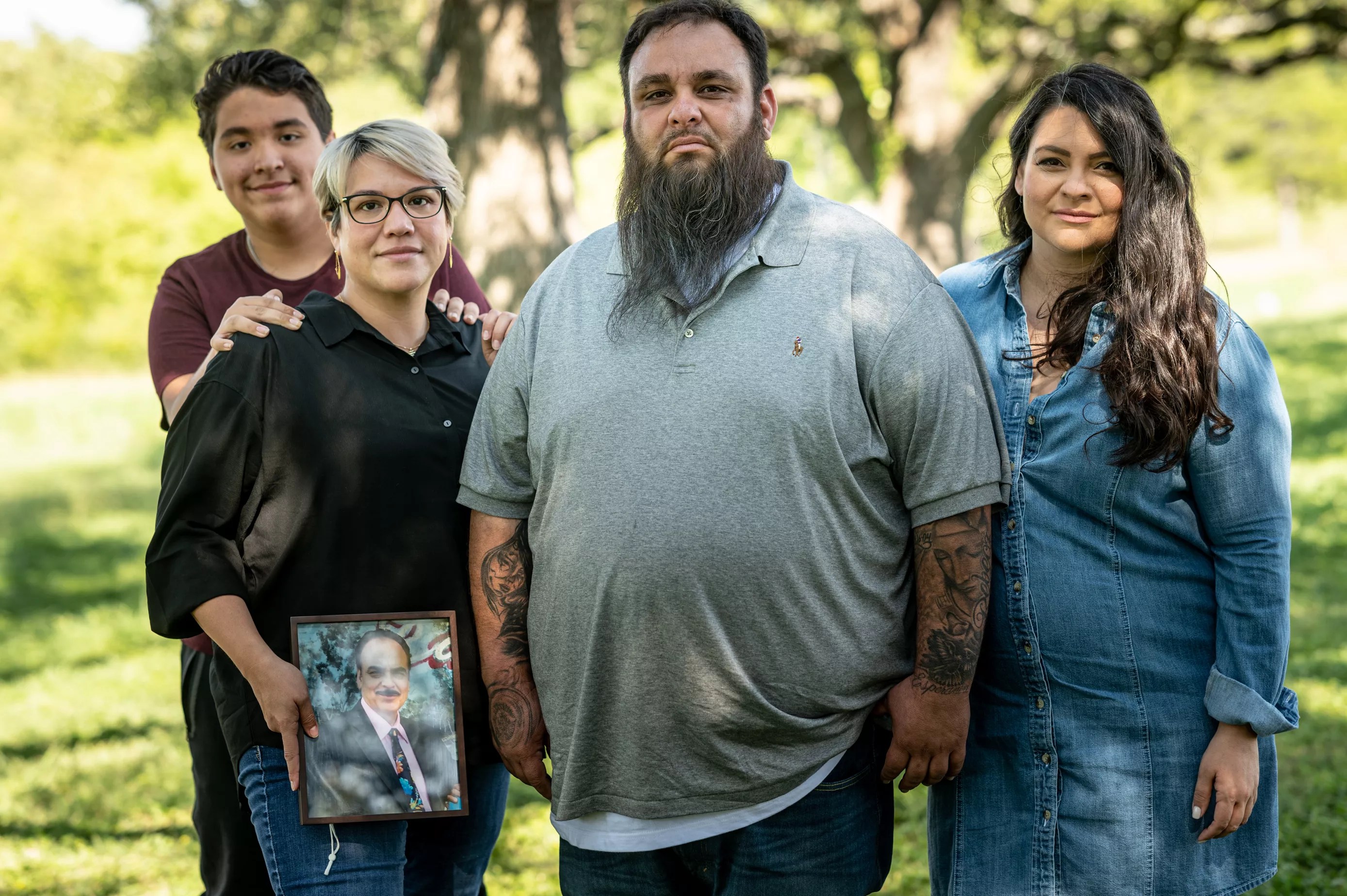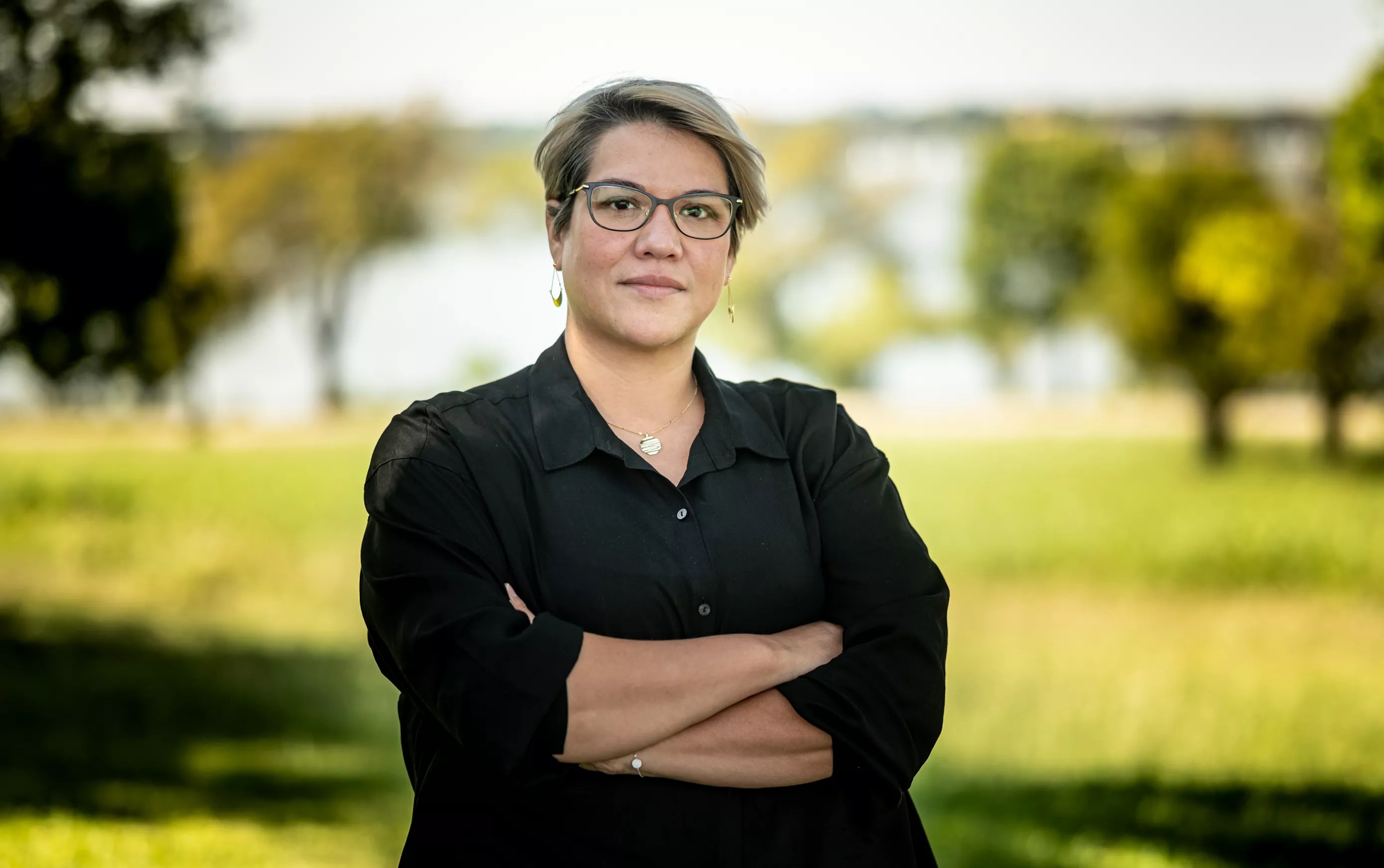
Mike Brooks

Audio By Carbonatix
First, it came for his father-in-law and grandma, then it took his dad and uncles. Within the span of six weeks, Dallas’ Jahaziel Salas lost five family members to the novel coronavirus.
Salas said he tries his best to be strong for his kids, but it’s been rough. He doesn’t want to become emotional around them.
“My kids think I’m their hero, so if they see me down … they’re going to be like, ‘Oh crap, my hero’s down,’ you know?” Salas said. “I don’t think it could get any more worse than 2020, that’s the way I think.”
Last week, Dallas County reached a grim milestone: 1,000 coronavirus deaths. It’s a marker that reveals the enormity of the COVID-19 pandemic, and there’s no telling how many more will be counted before there’s a vaccine. As of Monday, deaths from the disease hit 1,124 in Dallas County, according to Johns Hopkins University’s coronavirus resource center.
The tragedy that’s befallen Salas’ family has also ravaged countless others, with a virus that thrives off humans’ hard-wired need for social interaction. While some flippantly flout mask mandates and physical distancing guidelines, others struggle to cope with the grief that follows the loss of a loved one.
Salas’ father-in-law was included in Dallas County’s first 1,000 coronavirus deaths, but his other four family members, who all had strong Dallas ties, died in South Texas. (The coronavirus has hit the U.S. Hispanic population particularly hard, due in part to a combination of poverty, less access to health care and a high number of workers in “essential” jobs that can’t be performed remotely. Hidalgo County in the Rio Grande Valley, for instance, has one-third Dallas County’s population but 1,630 deaths as of Monday.)
Salas remembers his father, Nieves, as a jokester who loved to dance.
“It’s just profound, the sadness. You can’t even ever imagine that you’re going through it, let alone it’s like one, two, three, four people.” – Ana Alonso
Salas’ sister, Ana Alonso, thinks of her father similarly; forever happy, he was always the “life of the party,” she said. An athletic man with no underlying health conditions, her dad loved to box and ran 4 to 5 miles daily, she said.
That’s part of why seeing him hooked up to myriad machines in the hospital was so hard, Alonso said. Doctors told her that even if he survived, he would need to use an oxygen tank for the rest of his life.
But Alonso said that after she spent some time with her father, who was lying unconscious in the hospital bed, she knew he was ready to go. He died just two minutes after being taken off life support, she said. He was 62.
“It’s just been a very traumatic, you know, very heartbreaking,” Alonso said. “It’s just profound, the sadness. You can’t even ever imagine that you’re going through it, let alone it’s like one, two, three, four people.
“I still think, like, ‘Is this real? Is this really happening?'”
Salas said a nurse who knew that their dad would be cremated gave him a Ziploc bag. In it was a lock of his father’s hair, he said.
“It’s pretty much all we have of his remains,” Salas said.
Salas himself had the disease, although he was asymptomatic. His wife and her sisters were sick with it for weeks and temporarily lost their senses of taste and smell, he said.

Ana Alonso lost her father to COVID.
Mike Brooks
Dallas County Health and Human Services director Dr. Philip Huang said that it’s common for the disease to hit “family clusters.” One person who is exposed to the virus will unknowingly spread it to others, especially when a home holds multiple generations, he said.
Although the novel coronavirus has wreaked havoc around the globe, other infectious diseases have a much higher transmissibility rate. Dr. Erin Carlson, an associate clinical professor in the College of Nursing and Health Innovation at the University of Texas at Arlington, said that measles is just about the “most infectious thing ever,” with a sky-high reproductive rate; each new case of measles produces an additional 17, she said.
By contrast, COVID-19’s reproductive rate is around 5.7, which is more than twice what public health experts previously thought, Carlson said. The coronavirus is six times deadlier than the flu, according to WebMD, but even though it’s killing a small percentage of those infected, it’s adding up to be a “large number of deaths.”
Carlson said Dallas was uniquely poised to respond to the coronavirus. Dallas County Judge Clay Jenkins was also tasked with navigating 2014’s Ebola crisis, so he was primed to lead during this pandemic, Carlson said.
Guidance from Jenkins and Mayor Eric Johnson has been “exemplary,” she said. Their swift reaction to the virus was critical, as they knew that the Centers for Disease Control and Prevention wouldn’t swoop in to save the day, she said.
“I’m very impressed with how immediate their reaction was when this disease came to the United States,” Carlson said. “It is the difference between saving your community and not.”
Many have speculated that the region’s hospital systems would become overwhelmed, but that hasn’t yet happened. Huang said mask mandates have helped keep the city’s hospitals from exceeding capacity.
Had local leadership not acted decisively, Huang said Dallas could have looked a lot more like New York City.
New York Gov. Andrew Cuomo has widely been praised for his response to the pandemic. His state was the first to be devastated by the disease, but New York City was a week late in implementing shelter-in-place orders, Huang said.
Jenkins’ early stay-at-home and mask mandates kept Dallas from following suit, he added.
“We did it right when we needed to do it, and we flattened the curve and kept us from having a catastrophe,” Huang said.
Yet while Cuomo has been lauded, Texas Gov. Greg Abbott has been widely criticized. Both Democrats and Republicans have found fault in his response, albeit for very different reasons.
Carlson said Abbott is in a terrible position; never before has America politicized an infectious disease, she said. No matter what decisions he makes, he’s going to alienate around half of his constituents, she said.
Abbott has done his best to please both sides, though, said professor Matthew Eshbaugh-Soha, chair of the political science department at the University of North Texas. Although Abbott was initially reluctant, Eshbaugh-Soha said the governor eventually advocated for face coverings. That move pleased Democrats and angered Republicans who believe that mask mandates are an infringement on their rights.
Conversely, Abbott has gradually reopened the state’s economy, which satisfied Republicans but upset Democrats who believed that it would lead to unchecked coronavirus spread, Eshbaugh-Soha said.
The governor is damned if he does, damned if he doesn’t, Eshbaugh-Soha added.
“We can all second-guess, but you know, it’s hard,” he said. “Think about what you would do. If you lock down, people lose jobs; if you open up, people get sick. We aren’t usually aren’t faced with those sorts of trade-offs.”
Abbott’s approval rating regarding the coronavirus pandemic plummeted from 61% in April to 38% in July, the Houston Chronicle reported.
So far, the disease has caused more than 200,000 American deaths, nearly 16,000 of whom were Texans, according to Johns Hopkins. Even still, some believe that the coronavirus is a “hoax.”
For Salas, calling it a hoax is a slap in the face. When he hears someone speculate as to whether the virus is real, Salas said he’ll assure them that the funerals of his dad, father-in-law, uncles and grandmother were very much so.
Salas said he’s argued with people who refuse to wear a mask because they believe that the pandemic is a conspiracy.
With ever-increasing coronavirus case rates and deaths, Carlson said that it’s easy to forget that every single one of those numbers is a person. The disease will stop spreading if everyone is vigilant about wearing masks, social distancing and washing their hands, she said.
“These are preventable deaths of people who are family members, friends, members of our community, and every single one of their lives matters,” Carlson said. “We cannot just take this as a number. This is a national tragedy and a state tragedy and we cannot let the severity and the seriousness be lost on us.”